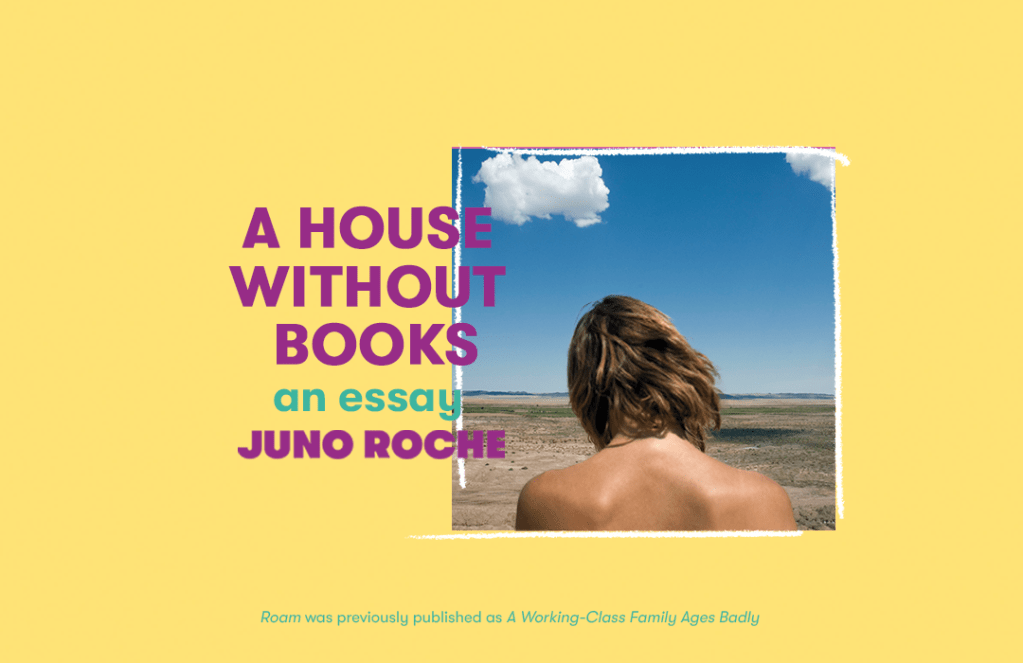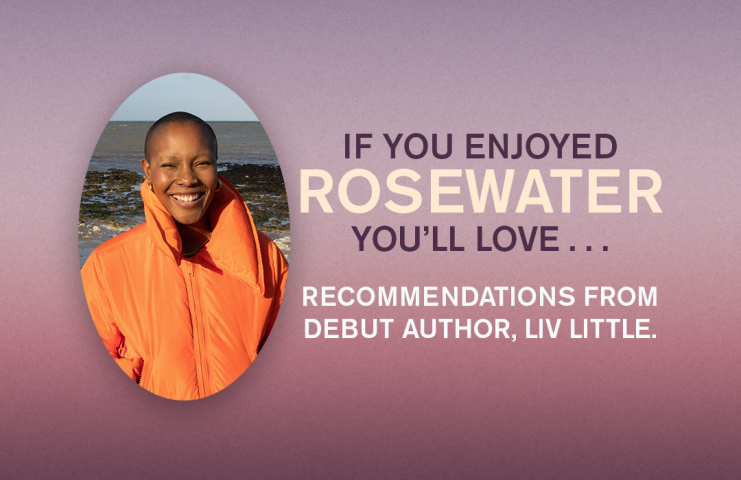‘A House Without Books’: An Essay by Juno Roche

To celebrate the paperback publication of ROAM: a search for happiness, we invited author Juno Roche to the website to write about their experiences of being a working class writer and how this stunning, thought-provoking memoir made its way to bookshelves.
1990 something.
I sat at the long wooden table, a table pitted with history, a table pitted through years of intense and excitable listening and learning. I sat at that table with the other students and watched as they relaxed into their chairs, watched them slide down and push their legs and feet under the table. Splayed and crossed. Watched them get comfortable in the room and with each other, they chatted, played with their hair, with their books and their pencils. They laughed, shuffled into their seats, and then melded naturally into that scenario.
I froze, looking at no one but at the wall directly in front of me. I froze and tried to control my breathing. Tried to breath silently. I was so nervous that my teeth started to chatter fearful indistinguishable words and sounds. I closed my mouth but then the sound amplified into shouts in my head, I parted my lips to allow the sound to escape and my lips quivered.
All I can remember of that moment, and I don’t remember anything logical or chronological in my brain but only as an embedded memory, as a feeling on my skin. A somatic memory of my skin prickling, of starting to sweat profusely, of palpitations, of the panic rising as the tutor asked us to briefly feedback our initial thoughts about one of the books from the summer’s reading list. All I could think to say was that I didn’t belong there, that I was in the wrong place, that I stupidly imagined that I could write and that I could do an MA in English Literature but it was stupid of me so I was sorry for wasting people’s time. My words gathered clumsily in a crowd at the back of my throat, I tried to cough them up but they were more scared to be apparent than me so they clung on to my tonsils, swinging from them as if they were a rope swing over a river. My words became disorientated and confused. We should have felt happy to be here. I’d dreamed of this as a happy day.
I left the room, found a toilet, slumped on the floor, and tried to count myself back into the room. That first day I couldn’t.
I was born into a house without books, into a house in which education had precious little, if any, real meaning. I had no idea how to sit comfortably in a room with a vast table, and shelves full of books and people who were so engaged with books that their words about books and about the words they were proposing to write, were already spilling out and littering the tabletop as if a festival, as if already at Cheltenham Literary Festival.
I had words to say, I had opinions and ideas but felt that I had no right to say them. When I left that day I went back to heroin to squash down any ideas of being a writer.
My BA Fine Art tutors had told me that I wasn’t an artist but that I was a writer so I should write. In every crack house, on every corner shooting up one kind of drug or another that single line kept coming back to me. You are a writer Juno you can write.
But still I didn’t think that I had the right to occupy words enough to allow them to be written and read. A writer is someone whose words are read. I wanted my words to travel and merge outside of me. For years I made copious notes everywhere. Scraps of paper, lined exercise books, the palm of my hand.
Years later at a conference I plucked up the courage to give a speech; I wrote that speech. It trended on Twitter and people said to me, Juno you should write. I rang mum and she said you can do anything Juno. I felt my skin prickle so again I rushed into a toilet in the conference centre, slumped onto the floor and tried to count myself into being a writer. Something happened when I reached the number 15.
I got up and left the toilet and a national newspaper asked if they could interview me. I said no, I’ll write the piece myself, you don’t have to pay me. I still had no sense of value. No sense that my words deserved any renumeration.
I would like to be able to say that from then, from that first piece in a national newspaper and in that counting up to 15 moment that something cemented in me without prickly embarrassed skin but it didn’t. I still felt like I was occupying the space of others – an imposter.
I still felt like an imposter right up until the second edit of this book – A Working Class Family Ages Badly. I’d written an opening to a chapter that I’d honestly felt utterly free and languid writing. Literally, whilst I was writing, my body let go of everything and fell into a kind of writing freefall. I felt fluid and free. The words felt both poetic and philosophical – both of my courses – the BA and MA had heavy philosophical elements; I’ve always been drawn to trying to understand the ‘whys’.
But at the back of my mind, it was the one part of the book that I felt sure that everyone would read and say, cut that section. I imagined a whole series of ‘whys’. ‘Cut that section because you’re not clever enough’, ‘cut that section because it’s stupid and pretentious’, ‘cut that section because you’re thick’.
Even writing the word ‘thick’ today makes me cry. I’m fifty-eight and writing that word makes me cry. I’ve been held by that word for fifty-odd years. A single word has held me back. Thick.
You come from that ‘thick’ family they’d say.
But then this thing happened. This weird moment happened that honestly allowed this iteration of me, this believing-in-myself me, to come into existence. Both my editor and my agent said, you must open the book with that section it’s exquisite. You need to write more of that.
Exquisite.
I said the word over and over again: exquisite. Exquisite words.
Fuck me, I felt like I could dance.
You are someone that can write ‘exquisite words’. Fuck me I have the capacity to be exquisite.
I’m not sure if anyone will understand this from reading the book because this realisation happened after it was written – perhaps they’ll understand from the next book, but in this book I became a someone that believed that they had the right to write and speak and, more importantly, be read and heard.
When we think about working class kids we think about quick fixes – send them to Oxford or Cambridge. But, having been a teacher, I’d say send every child home with free books and then more books, keep them coming, try to fill a shelf in their homes with books and then allow them time in our vastly overloaded and often pointless curriculum to sit and read and importantly to discuss their books. Their books, allow them to have their books. Allow them to start thinking that their words are valid and that they have an inalienable right to be heard. To express opinions. Some kids will go home and hear nothing but the wrong kinds of noise.
The book is called A Working Class Family Ages Badly and I have, but that’s changing because someone, or some people said your writing is exquisite. Imagine that. Such a few words to change a life.
Imagine.
Exquisite. You can write.
Juno Roche
Juno Roche is a writer and campaigner whose work around class, gender, sexuality and trans lives has been funded by the likes of The Paul Hamlyn Foundation and described as ‘provocative and innovative’.
Juno studied Fine Art and Philosophy at Brighton and English Literature at Sussex, and writes for a wide range of publications including Bitch magazine, Dazed, Vice, Broadly, Cosmopolitan, the i, The Independent, i-D, the Tate magazine and Refinery29. They are the author of four books: Queer Sex, Trans Power, Gender Explorers and their memoir, ROAM: a search for happiness.







